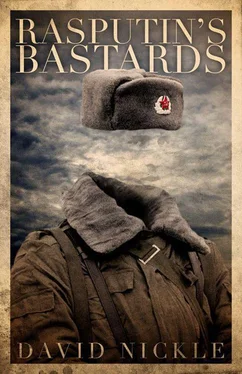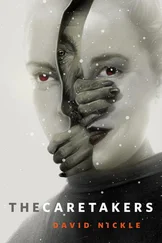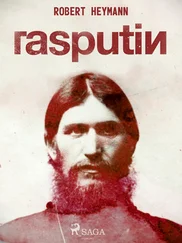“Your hand okay?” said Kilodovich.
“Nothing broken,” said Montassini. “Little sore though.”
“Sorry.”
“Hey — I was pointin’ a gun at you then I let my guard down. I’d have done the same thing in your shoes.”
“You are a forgiving soul.” Kilodovich reached into his waistband and pulled Montassini’s gun out. He pointed it at Montassini’s chest too.
“Yeah, whatever.” Montassini stretched in front of the UFO. He felt his joints cracking. Kilodovich backed away, holding both guns up.
He frowned. “Mr. Bucci… You said he was the man who sent you?”
“Yeah.”
“Bucci. Hah. Where have I heard that name before? Wait. Gepetto Bucci?”
“Yeah,” said Montassini, “ that Bucci.”
Kilodovich raised his eyebrows and tilted his head. “Hmm.” He backed up, and motioned Montassini over to the steps. “Why would the Italian Mafia be looking for me, now?”
Montassini shrugged. “A favour,” he said.
Kilodovich put Montassini’s gun into his waistband and scratched his stomach with his free hand. His own gun he kept trained on Montassini’s stomach. “A favour for who?”
“Some fuckin’ Turk he does business with. Amar he calls him.”
Now Kilodovich lowered the second gun. If Montassini had wanted to, he probably could have jumped him — grabbed the gun back — and had him face down on the floor. Kilodovich’s mouth opened and closed, and he stared at the floor. That look in his eye dissolved, and for a moment his face held the innocence of a child. Montassini knew he could have taken him now — but fuck. They were soulmates, he and Alexei Kilodovich. You don’t fuck with your soulmate.
“Amar…” Alexei snapped his fingers. “Amar Shadak!”
“Yeah — that sounds right. Amar Shadak. Turkish guy. Part owner of a camping store that the boss bought off two old Russians back in—”
But Kilodovich wasn’t listening. He was getting that faraway look that had become very familiar to Montassini, since he’d come back to the Emissary Hotel, met that killer maid and started on this insane road trip to hell. Kilodovich was in — what was the word the tour guide had used?
He was in —
Rope?
Rupture?
Montassini snapped his fingers. Oh yeah. That was it.
“Rapture.”
Montassini took Alexei by the arm and led him to the door. “It’s going to be all right, pal,” he said, and reached for the gun in Alexei’s hand. “Just give me that.”
Alexei looked at him for a moment — and for just a moment, it seemed as though Montassini could see eternity in Alexei’s eyes. Like he’d opened up that safe place he put himself, and something older — bigger — had come up.
And then the look passed, and Alexei blinked — and grinned for an instant like a newborn.
“Give me that,” said Montassini.
Slowly, as though in a dream, Alexei shook his head. “I keep the gun,” he whispered in another voice, one still not his own. “And Alexei is all right now. No Rapture for him.”
Montassini cracked open the door and peered outside. The tour group was long gone — but he could hear them. He could hear a thousand of them, humming some song down by the harbour.
“So all right,” said Montassini, “what do we do now?”
“Rescue me.”
Darya Orlovsky spun and reeled in the perfect winter’s light, long braids of dark hair trailing over her shoulders like lariats. Her eyes were fixed on a place in her dreams: the City of New Pokrovskoye, the greatest port in the Empire. Snow fell like flakes of gold in a winter afternoon. Godly white horses that pranced in front of a sledge bearing lovers snuggled in thick grey furs. The girl laughed, and spun, and thought to herself with desperate joy:
Bullshit. Bullshit metaphor .
She whirled then, prancing down a long flight of stone steps to the Square. Her father was there — playing an accordion festooned with jewels, in the midst of a circle of girls who danced as though with one mind. His teeth flashed beneath his thick moustache. His eye twinkled. “Darya!” He called. “My little petrushka! Join the dance!”
“Papa,” she called happily. But that is not what she thought.
She thought: Killer .
A cold, soul-dead killer who came north with a baby daughter and wife in tow; who took hands that had stabbed and strangled and squeezed triggers and brought them to a fishing village — washed them clean in brine of ocean and blood of cod. And now whose hands played over the keyboard of the accordion, making it sing a song that no one could resist.
Darya lifted her skirts and spun back the way she’d come, up the stairs and away from the square. As she turned, she looked over the rooftops of this place. They were high-peaked, shingled in fine slate pulled from quarries at the Empire’s southern mountains. They overhung houses and apartments and in the distance, a long low palace surrounded by gardens where the Tsarina , the Babushka held court in the summertime but now —
Now is summertime , she thought.
And then she thought: How did I know this ?
And then she whirled again along a broad platform on the edge of the cliffs that surrounded New Pokrovskoye — and she beheld the fountains and the Parliament House and the port, and the great curtain wall where in direr ages there patrolled the Tsar’s guard. Now, the people of New Pokrovskoye danced along it, moving in a great human wave in the afternoon light — praising—
—praising—
Darya spun and turned and felt her knees buckle. And for a moment, she stopped dancing.
The world grew dimmer then and the snow faded, and for a moment she blinked, for the light had vanished. And she thought about the man who’d taken her in the Museum of Family History. She remembered the touch of his hand on her bare thigh and the feeling of his lips as they brushed her mouth, the scraping of his tongue against her teeth, and as she did she blinked again.
She was standing in a crowd, in the darkness of the true New Pokrovskoye, near the pier where her father tied up his boat. The crowd was swaying back and forth and humming, and she felt a touch at her shoulder and she turned — in time to see two figures, the only two who did not seem to be keeping a rhythm. Darya took a breath. For one of them —
—one of them was he. He moved with a hunter’s ease. The other, a small man with slicked back hair, followed nervously. “These fuckin’ zombies give me the creeps,” he whispered. And the big man, Darya’s hero, muttered something low. Darya spun closer to hear the end of the sentence.
“—no waste,” he said. “We die soon.”
Darya didn’t care about dying soon. She wanted to follow him. Ignoring the call of the song, she elbowed her way through their fast-closing wake.
He was a hero — one who would not succumb. That was why she’d picked him. She had a sense of these things.
“There you fuckin’ go, ‘we die soon.’ We’re not goin’ to die soon. This is some fuckin’ kind of dance.”
“Not we. We .”
“What the fuck?”
The two were heading back toward the store that she’d managed all these years. They were moving quickly — quicker than Darya herself could. She stumbled through the crowd of strangers here in New Pokrovskoye — the people who had come heeding the call. There were so many of them — people who had come like invaders — eating their food and drinking their tea and sleeping in their homes.
The man and his friend were gone and she stood amid a forest of strangers. They moved and swayed rhythmically under the sky — and in spite of herself, she found that she was doing the same. It was a tempting thing to do — to fall back into the magnificent dream that they’d concocted for themselves, an amplification of the game that had played itself out in her dreams when she was just a little girl. She remembered those dreams fondly — sitting at Babushka’s feet in the school house, the old woman beaming down at them and beginning: “Have I told you the story of the two stallions, my Children?” and then beginning with a whistling of wind, and transporting them all to such a wonderful place — a place like the Empire.
Читать дальше












